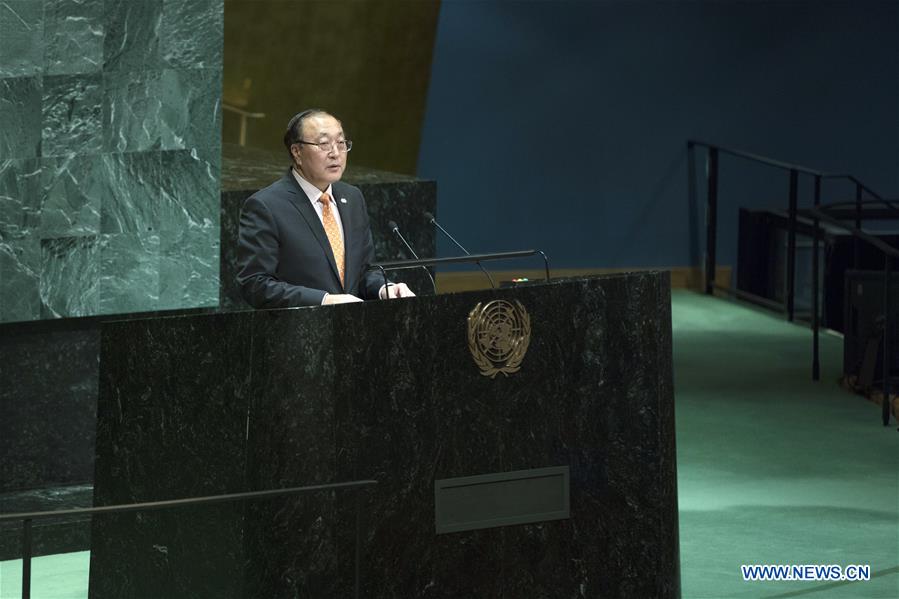
Zhang Jun, China's Permanent Representative to the United Nations, addresses the UN General Assembly's plenary meeting on the necessity of ending the U.S. embargo against Cuba, at the UN headquarters in New York, Nov. 6, 2019. The Chinese UN ambassador on Wednesday voiced hope that the United States and Cuba will continue to advance the normalization of their relations. (Xinhua/Li Muzi)
UNITED NATIONS, Nov. 6 (Xinhua) -- The Chinese UN ambassador on Wednesday voiced hope that the United States and Cuba will continue to advance the normalization of their relations.
Zhang Jun, China's Permanent Representative to the United Nations, made the remarks during his speech at the UN General Assembly's plenary meeting on the necessity of ending the U.S. embargo against Cuba.
Zhang said China hopes the United States will abolish its embargo policy against Cuba as soon as possible, noting that from April 2018 to March 2019 alone, the embargo caused Cuba 2 billion U.S. dollars of foreign trade losses as well as over 700 million dollars of financial assets.
"This is contrary to the purposes and principles of the UN charter and the relevant resolutions of the UN general assembly," he said, adding "the embargo has also hampered the efforts of the Cuban people to eradicate poverty and achieve other sustainable development goals."
He stressed peace, development cooperation and win-win relations have become the motive of our times and the general trend of globalization is unstoppable. "Dialogue as equals and friendly consultation are the best ways to resolve differences. Unilateralism, protectionism and bullying will eventually harm those who perform such acts."
In this context, he said both the United States and Cuba should move "with the historical trend of our times" through developing normal interstate relations, which serves the common interests of the two countries and their peoples, and promote peace and stability throughout the Americas.
The two-day General Assembly meeting is expected to consider a draft resolution submitted by Cuba against the U.S.-imposed embargo.
Zhang said China will vote in favor of the draft resolution, which is likely to be adopted by an overwhelming majority as was the case over the past 27 consecutive years.
He said China consistently advocates for respecting the right of countries to independently choose their own social systems in development path, and is against imposing unilateral sanctions on other countries by military, political, economic or other means.
He added China and Cuba have maintained economic trade and personnel exchanges and the friendly and mutually beneficial cooperation in all fields continues to move ahead.
U.S.-Cuban relations have soured since President Donald Trump assumed office in 2017. Since then, the U.S. administration has partially rolled back the detente initiated by former president Barack Obama and reverted to Cold War rhetoric, while maintaining re-established diplomatic ties.
The United States first imposed an arms embargo on Cuba in 1958. The embargo was complemented by the U.S. introduction of restrictions in various other sectors, including sanctions on financial transactions, trade and travel.
Obama issued regulations to ease people-to-people contacts. But Trump toughened the blockade policy by restricting travel, boosting the economic embargo and imposing sanctions on Raul Castro, first secretary of the Central Committee of the Communist Party of Cuba.



